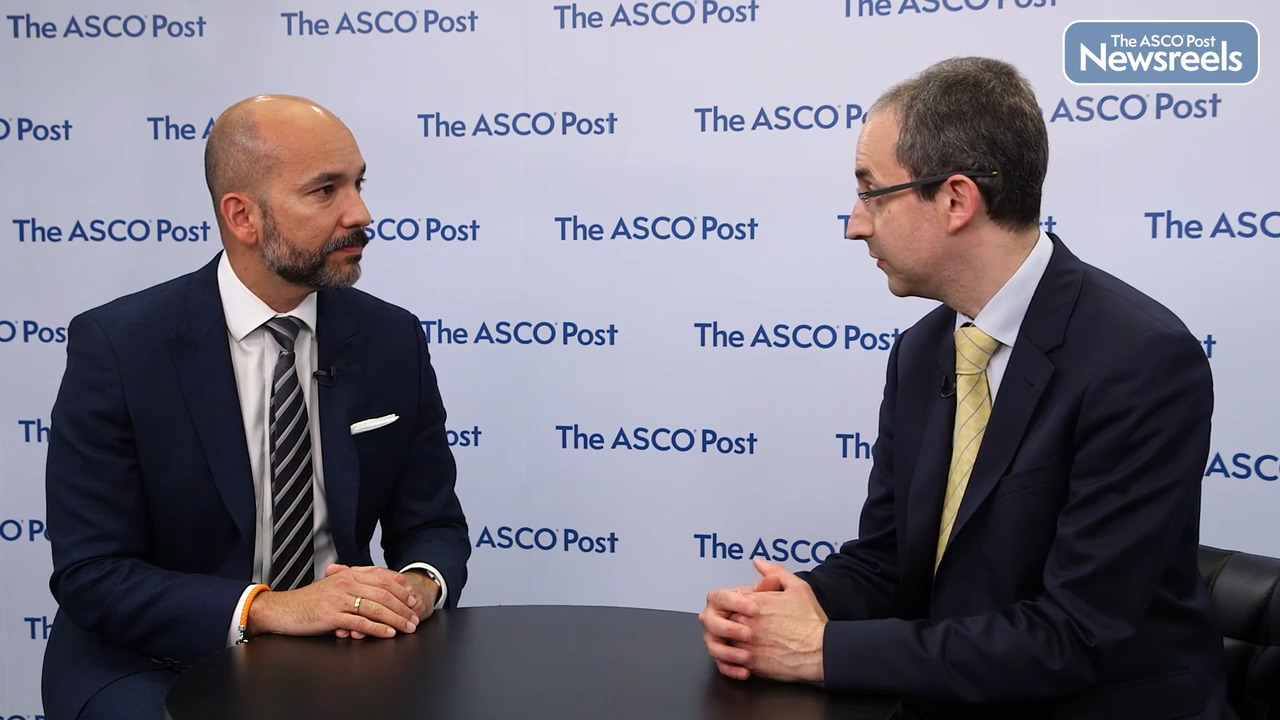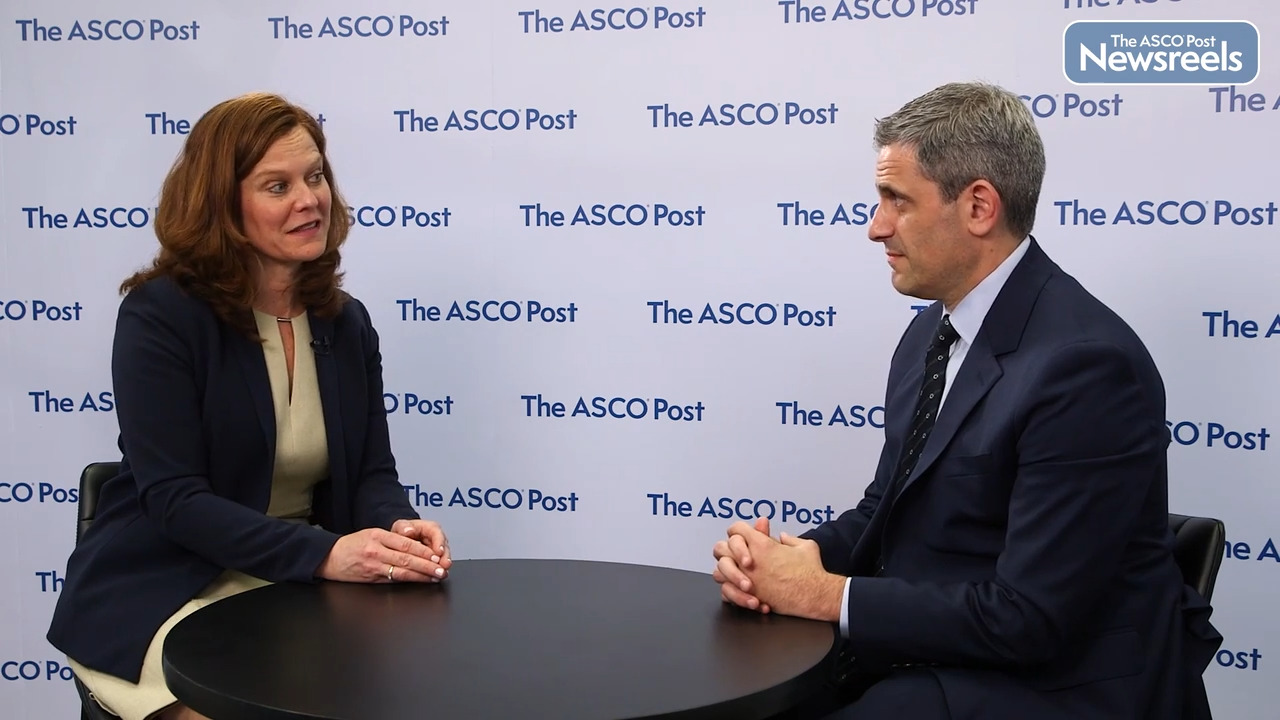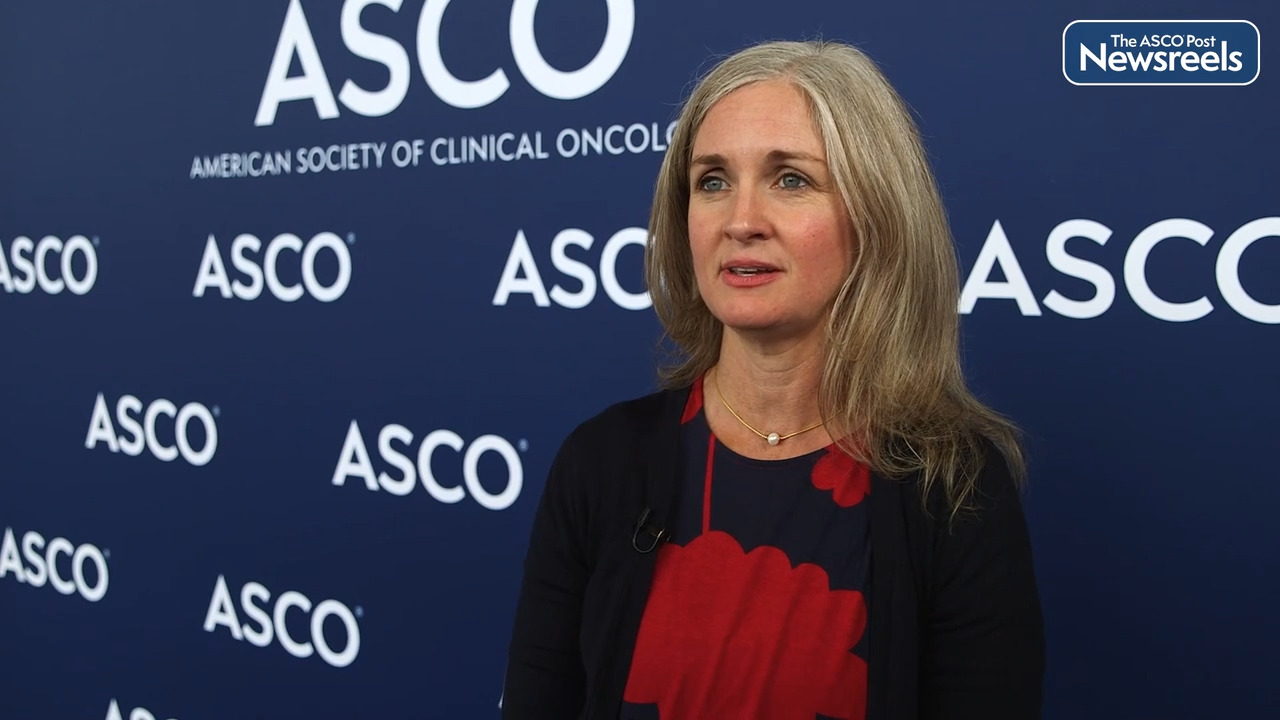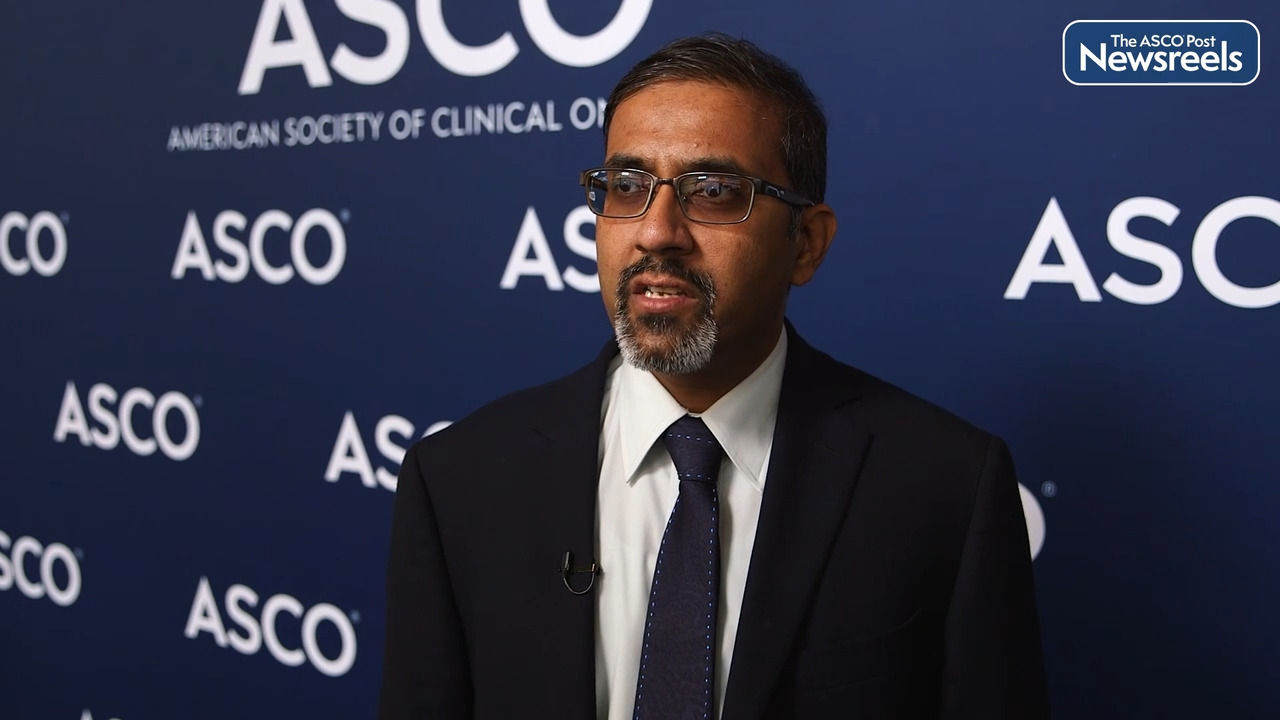Transcript
Disclaimer: This video transcript has not been proofread or edited and may contain errors.
Jonathan Rosenberg: It's great to see you today, Tom. So can-
Tom Powles: It's nice to see you, Jonathan.
Jonathan Rosenberg: Can you talk to me a little bit about your abstract on KEYNOTE-426?
Tom Powles: Yes. It's an abstract by a group of investigators in kidney cancer. It's actually the first VEGF TKI IO combination associated with a survival advantage, axi-pembro. Axitinib, great drugs, short half-life. Pembro, we know all about, great PD-1 inhibitor. And the combination, the data, the original data, is now quite old. And in fact, it's a widely used combination. The original data has a hazard ratio of survival of 0.53 when we first did the analysis, but that's drifted downwards now and it's actually about 0.71. It's still significant, 30% reduction in the risk of the death, which is great. And there are other combinations, cabo-nivo and [inaudible] and actually their survival advantage is identical. Identical, very, very similar. There are more similarities than differences between these combinations and they're widely used as the standard of care. There's ipi-nivo, which is an alternative. And I'm not getting into that debate with you today, but I can do.
Tom Powles: But we showed high response rates for the combination, at about 60%. We showed a disease free survival advantage, PFS advantage of about 0.6 as well. So you've got this DFS advantage, response advantage and survival advantage, which is terrific. So superseded sunitinib, bit of a debate about the good risk patients. What we did today was we looked for PFS2, which is a strange and complex component. And I think it's-
Jonathan Rosenberg: Well, explain that to us. Explain what it means [inaudible].
Tom Powles: I'm going to do my best, but I don't know if I've ever done it well. So essentially we know PFS1, that's the time to progression on your first-line therapy. In fact, you take the drug and you keep going on it. And then when the cancer grows by 20% or you develop new target lesions, that defines progression radiologically, and that's how we do it. And then of course there's overall survival and we know how that works. PFS2 takes into account not just the first drug but also the second drug. So-
Jonathan Rosenberg: So the subsequent therapies.
Tom Powles: The subsequent therapy as well. It's combining those two periods together. So it's not exclusively the subsequent therapy. And so let's say first time axi-pembro, 15 months your standard PFS, average 15, and then subsequent sunitinib, which would be a reasonable second-line drug to give or cabozantinib. And let's say that's six months. And so 15 plus 6, 21 months PFS. And the reason it's important is some people believe that because you're giving two really powerful drugs to start with, the next one might not work very well. And therefore that might dilute down the overall effects. And so let's take another example. The sunitinib patients, they're only on sunitinib for six months, but they get a second-line, second cabozantinib or nivolumab, and that's 10 months. And then those two combined would then be 16 months. So it'll be 25 versus 16 months. And that's essentially how PFS2 works. And what we showed in this trial was the PFS2 advantage is persistent.
Tom Powles: So despite the fact that second-line therapy may work a little bit better after if you haven't had axi-pembro, it doesn't really appear to be the case because PFS2 is essentially still much better with a hazard ratio of about 0.7 for axi-pembro compared to sunitinib.
Jonathan Rosenberg: So the principle is put your best foot forward initially and on the back end, you'll make it up with other treatments.
Tom Powles: Brian [inaudible] always said saving the good drugs in the cupboard for a rainy day is not the right thing to do. Give the best drugs you can at the start. And I think that's true in many aspects of cancer medicine.
Jonathan Rosenberg: Right. And so where do you think this takes us as we're thinking about new drug development otherwise?
Tom Powles: So there's a trial called COSMIC-313 coming out soon. It's cabo-ipi-nivo versus ipi-nivo. It's a really important study. And the reason it's important study is it's testing the triplet. Again in other cancers, recently, prostate cancer, we've shown the triplet better than the doublet. So that's a really important question. The other important question I think this data is relevant here is in the good risk [inaudible], IMDC good risk population favor risk. There's a debate there's not a clear survival signal. There is higher response rates. There's better PFS. And that's across for all the combinations, except [inaudible]. I'm talking about the VEGF TKI IO combinations. And in this population, there is debate in the VEGF TKI IO because there's no clear survival advantage yet and the hazard ratios are about one. Some people saying, "Well, there's no benefit. Why not just give sunitinib?"
Tom Powles: And so the response rate's higher, but we've also shown PFS2 is longer as well. And so that might actually influence some people saying, "Well, this probably is the right approach." We haven't yet reached anywhere near the medians in this good population. And it's possible that five or 10 years down the line, we're curing 20, 30, 40% of these patients. We don't know that yet. And so I think when you see a favor risk patient at the moment, you can say actually many of the components, including PFS2, looks better in this population. We haven't got enough OS yet. And so that's how I think it adds. Do I think PFS2 is more important than overall survival? No, of course not. Overall survival is the gold standard. You might say, "Well, you got OS already. Why bother with PFS2?" That's a very valid question. And I think perhaps it's that good risk population and also the proof of principle that PFS2 is out there is relevant.
Jonathan Rosenberg: The proportion of patients who get complete responses, are they behaving differently with TKI IO in terms of relapses? Are you're seeing that late effects on the trial?
Tom Powles: So I think that it's fair to say that complete response is one of those areas of huge controversy in kidney cancer. And not all patients can achieve a complete response. And your chances of achieving a complete response is much higher if you have lung only disease than if you have both. In fact, you can't have a complete response if you have bone disease. And if one looks at the [inaudible] data, which has the highest CR rate, not ipi-nivo. [inaudible] has the highest CR rate. Now we did think it was ipi-nivo and something magic about that with CR. It's not the case. And you look at the [inaudible] data, actually, is they have a higher proportion of lung only patients and then we'll... So the reality is they've got more favor risk patients, and that's why they're having more CRs.
Tom Powles: And I think CR is not as useful surrogate marker of done efficacy. I think it's a surrogate marker of patient population. And that's a little bit controversial and I'll probably get... Someone will email me and say, "Tom, you're absolutely wrong," which by the way, I've been wrong before. So that's the first thing. But the second thing you've said, which I think is reasonable, is about durability. And yes, absolutely. There is a clear durability of response. Having an immune therapy up front is better. So if you're having VEGF TKI IO, not only a higher response rate, but longer [inaudible]-
Jonathan Rosenberg: A longer duration of response.
Tom Powles: One of the questions we're asking is how long do you have to give the drugs for? And we don't know the answer to that. I mean, people are giving pembro over two years. Nivo, you keep going. And VEGF TKI, you keep going. If you ask me what I'd like to do, I'd like to do trials where we stop the VEGF TKI. I think the VEGF TKI is probably most effective for the first six months. It's probably marginally effective in the first year. But patients five years down the line taking axitinib [inaudible] I don't feel super comfortable about it, but we need to do those trials. We're not super good at doing investigator initiated trials, big randomized trials in these sort of post sort of approval settings. And it's a shame.
Jonathan Rosenberg: And deescalation trials are hard to do to begin with because-
Tom Powles: Yeah, but we could do it.
Jonathan Rosenberg: We could. I know
Tom Powles: You could do it, but certainly the pharmaceutical industry won't do it. So that's something we should be doing [inaudible] therapy times, [inaudible]. We can do those studies, and cooperative group, drug discontinuation studies. You can restart the drug afterwards. And I think-
Jonathan Rosenberg: Right. Right. Exactly. And often recapture [inaudible].
Tom Powles: I'd love to see that study.
Jonathan Rosenberg: Thank you very much for taking us through the study, your data.
Tom Powles: Thank you for asking me.
Jonathan Rosenberg: It's been a pleasure. Thank you.





